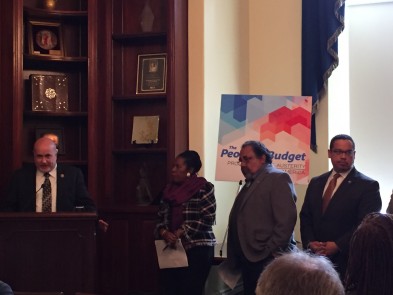Abortion rights, women of color, and LGBTQI+ people are under attack. Pledge to join us in fighting for gender justice.
The People’s Budget: A Down Payment on a Brighter Future
The spending priorities in our federal budget reflect the values that we hold as a country, and there could hardly be a more stark contrast of values than between the budget being considered today by the House Budget Committee and the Congressional Progressive Caucus’ People’s Budget, spotlighted at a press conference yesterday. While the proposed Budget Committee plan cuts critical programs that women and their families depend on, the People’s Budget recognizes that working women shouldn’t have to choose between holding down a job and caring for their families, and they should have increased opportunities for success at work, at home, at school, and in their communities.

The People’s Budget understands the reality that, in the recovery from the Great Recession, many are still scrambling to get by—and that this burden falls especially heavily on women and their families. This budget strengthens existing policies that support working families, reverses harmful cuts, and puts promising new initiatives into place. The Economic Policy Institute estimates that, as a result, the budget would “sharply accelerate economic and employment growth,” creating 3.6 million jobs in the near term. As the executive summary states, “The People’s Budget is a down payment on a brighter future for all Americans, ensuring every family struggling to make ends meet has a fair shot at the American Dream.”
Some highlights of the People’s Budget include proposals that would:
Improve workplace policies and increase wages. The People’s Budget calls for an increase in the minimum wage and raises the income threshold under which workers are automatically eligible for overtime pay to $69,000 (even higher than the updated threshold proposed by the Department of Labor last summer). Reforming overtime rules is an important step toward closing the gender wage gap. The budget also endorses the Healthy Families Act, which would ensure that workers have up to 7 days annually of paid sick leave. And it calls for executive action to give preference for federal contracts to companies that provide living wages, paid leave, and health care benefits, and respect their employees’ right to collectively bargain.
Increase access to early learning opportunities—and higher education, too. The People’s Budget understands the importance of the early years to children’s development and long term success, and invests $80 billion to adopt President Obama’s initiative to expand child care to all eligible low-income families with children 3 and under. Additionally, it fully funds Early Head Start; provides universal pre-kindergarten access; and provides $10 billion in additional funding for child nutrition programs, which, among other things, would allow an extra snack for children in long-term child care. The budget also makes critical investments in K-12 education and college access by fully funding Title I of the Elementary and Secondary Education Act, creating a federal matching program to support state efforts to expand affordable higher education, and boosting funding for federal student aid programs.
Create a stronger safety net. This budget restores funds that have been cut from the Supplemental Nutrition Assistance Program (SNAP/food stamps) and makes permanent the enhanced levels established in the American Recovery and Reinvestment Act. It also grants workers who have lost their jobs through no fault of their own up to 99 weeks of unemployment benefits in high-unemployment states. Furthermore, the People’s Budget endorses expanding Social Security benefits and adopting an inflation measure that more accurately reflects the costs that seniors and individuals with disabilities are facing—which would be paid for by gradually phasing out the cap on Social Security contributions that currently applies to the wealthiest taxpayers.
Expand tax breaks for working families—not for wealthy individuals and corporations. The People’s Budget expands tax credits for low- and moderate-income workers, including by broadening EITC eligibility for workers without dependent children. It also creates a more fair corporate and individual tax structure, closing wasteful tax loopholes and ensuring that the wealthiest individuals and corporations pay their fair share of taxes—which raises revenue to fund the crucial investments throughout the budget.
Help women and their families get the comprehensive, affordable health services they need. The People’s Budget strikes the Hyde Amendment, which withholds federal funds from being used for abortion in almost all circumstances, and increases funding for Title X reproductive health services.
When policymakers debate the FY 2017 budget, they should look no further than this impressive blueprint, which would make a significant difference in the lives of women and their families.





